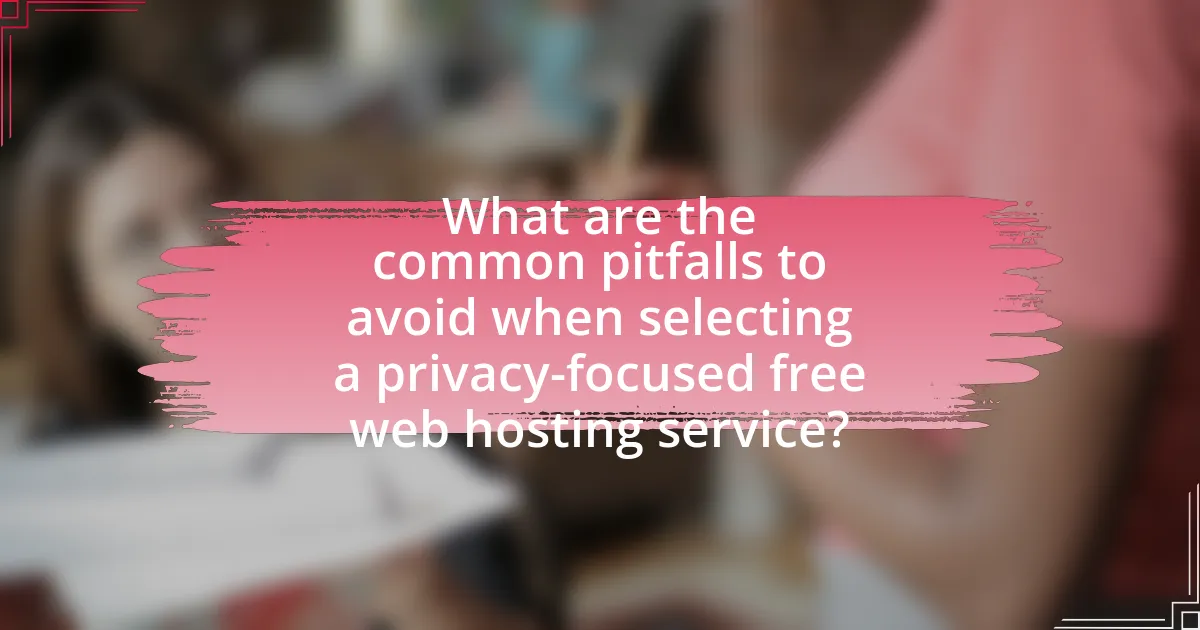A privacy-focused free web hosting service is a platform that offers web hosting without fees while emphasizing user privacy and data protection. This article outlines the differences between privacy-focused and traditional hosting services, highlighting essential privacy features such as encryption, anonymous payment options, and strict no-logs policies. It discusses the importance of privacy in web hosting, the benefits of using privacy-focused services, and factors to consider when selecting a provider, including data protection policies and server locations. Additionally, it addresses common pitfalls, red flags, and best practices for maintaining privacy while using free hosting services.

What is a Privacy-Focused Free Web Hosting Service?
A privacy-focused free web hosting service is a platform that provides web hosting without charging fees while prioritizing user privacy and data protection. These services typically do not track user activity, do not sell personal data to third parties, and often implement strong encryption and security measures to safeguard user information. For example, some privacy-focused hosting providers may operate under jurisdictions with strict privacy laws, enhancing the protection of user data.
How does a privacy-focused web hosting service differ from traditional hosting?
A privacy-focused web hosting service prioritizes user data protection and anonymity, differing from traditional hosting that often collects and monetizes user data. Privacy-focused services implement strict data protection policies, utilize encryption, and may operate under jurisdictions with strong privacy laws, such as GDPR in Europe. In contrast, traditional hosting providers may share user information with third parties for advertising or analytics purposes, lacking the same level of commitment to user privacy. This distinction is crucial for users seeking to safeguard their online presence and maintain confidentiality.
What privacy features should be included in a privacy-focused web hosting service?
A privacy-focused web hosting service should include features such as end-to-end encryption, anonymous payment options, and a strict no-logs policy. End-to-end encryption ensures that data is protected during transmission, preventing unauthorized access. Anonymous payment options, like cryptocurrency, allow users to pay without revealing personal information. A strict no-logs policy guarantees that the hosting provider does not store any user activity data, which is crucial for maintaining user privacy. These features collectively enhance user security and confidentiality, aligning with the principles of privacy-focused services.
Why is privacy important in web hosting services?
Privacy is important in web hosting services because it protects sensitive data from unauthorized access and misuse. When users host websites, they often store personal information, financial details, and proprietary content that, if exposed, can lead to identity theft, financial loss, or reputational damage. According to a 2021 report by Cybersecurity Ventures, cybercrime is projected to cost the world $10.5 trillion annually by 2025, highlighting the critical need for robust privacy measures. Additionally, regulations like the General Data Protection Regulation (GDPR) mandate that web hosting services implement strict privacy protocols to safeguard user data, ensuring compliance and fostering trust between service providers and clients.
What are the key benefits of using a privacy-focused free web hosting service?
Using a privacy-focused free web hosting service offers enhanced data protection and user anonymity. These services prioritize user privacy by implementing strong encryption protocols and minimizing data collection practices, which reduces the risk of personal information being sold or misused. Additionally, they often provide features such as anonymous domain registration and the option to use cryptocurrency for payments, further safeguarding user identities. According to a study by the Electronic Frontier Foundation, privacy-focused services significantly lower the chances of data breaches and unauthorized access, making them a reliable choice for individuals concerned about their online privacy.
How does a privacy-focused service enhance user security?
A privacy-focused service enhances user security by implementing strong data protection measures that limit unauthorized access to personal information. These services often utilize end-to-end encryption, ensuring that user data is only accessible to the intended recipient, thereby reducing the risk of data breaches. Additionally, they typically have strict data retention policies, minimizing the amount of personal information stored and thus lowering the potential for misuse. For instance, a study by the Electronic Frontier Foundation highlights that services prioritizing user privacy often employ advanced security protocols, which significantly decrease the likelihood of cyberattacks and identity theft.
What advantages do users gain from free hosting options?
Users gain several advantages from free hosting options, primarily cost savings and accessibility. Free hosting eliminates financial barriers, allowing individuals and small businesses to establish an online presence without upfront investment. Additionally, many free hosting services offer user-friendly interfaces and easy setup processes, making it accessible for users with limited technical skills. According to a survey by HostingAdvice, 70% of users prefer free hosting for personal projects due to its no-cost nature, highlighting its appeal for those testing ideas or starting small ventures.

What factors should you consider when choosing a privacy-focused free web hosting service?
When choosing a privacy-focused free web hosting service, consider the provider’s data protection policies, including how they handle user data and whether they comply with privacy regulations like GDPR. A reputable service should clearly outline its commitment to user privacy, including encryption practices and data retention policies. Additionally, assess the hosting service’s transparency regarding third-party partnerships, as these can impact your data security. Look for user reviews and independent assessments that validate the provider’s claims about privacy. Finally, evaluate the technical features offered, such as SSL certificates and secure access protocols, which are essential for maintaining privacy online.
How do you evaluate the privacy policies of web hosting services?
To evaluate the privacy policies of web hosting services, examine the clarity, comprehensiveness, and enforceability of the policies. Clear policies should explicitly outline data collection practices, user rights, and data sharing with third parties. Comprehensive policies include details on data retention, security measures, and user consent processes. Enforceability is assessed by checking for compliance with regulations such as GDPR or CCPA, which mandate specific privacy protections. For instance, a hosting service that adheres to GDPR must provide users with the right to access, rectify, and delete their personal data, demonstrating a commitment to privacy.
What specific terms should you look for in a privacy policy?
When reviewing a privacy policy, specific terms to look for include “data collection,” “data usage,” “data sharing,” “user rights,” and “data retention.” These terms clarify how the service collects personal information, the purposes for which it is used, whether it shares data with third parties, the rights users have regarding their data, and how long the data is stored. For instance, a privacy policy that explicitly states it does not sell user data to third parties provides assurance of user privacy. Additionally, policies that outline user rights, such as the ability to access, correct, or delete personal information, demonstrate a commitment to transparency and user control over personal data.
How can you verify the claims made in a privacy policy?
To verify the claims made in a privacy policy, review the policy for specific details about data collection, usage, and sharing practices, and cross-reference these details with independent sources. Independent audits or certifications from organizations like TRUSTe or the Better Business Bureau can provide additional validation of the claims. Furthermore, user reviews and experiences can reveal discrepancies between the stated policies and actual practices, highlighting any potential issues with transparency or compliance.
What technical features are essential for privacy-focused web hosting?
Essential technical features for privacy-focused web hosting include strong encryption protocols, anonymous payment options, data minimization practices, and robust privacy policies. Strong encryption protocols, such as SSL/TLS, protect data in transit, ensuring that user information remains confidential. Anonymous payment options, like cryptocurrencies, allow users to pay for services without revealing personal information. Data minimization practices limit the collection and retention of user data, reducing the risk of exposure. Additionally, robust privacy policies outline how user data is handled, providing transparency and assurance to users. These features collectively enhance user privacy and security in web hosting environments.
How important is data encryption in web hosting services?
Data encryption is crucial in web hosting services as it protects sensitive information from unauthorized access and cyber threats. By encrypting data, web hosting services ensure that information such as personal details, payment information, and login credentials are rendered unreadable to anyone who intercepts it. According to a report by Cybersecurity Ventures, cybercrime is projected to cause damages exceeding $10.5 trillion annually by 2025, highlighting the necessity of robust security measures like encryption. Furthermore, the implementation of encryption protocols, such as SSL/TLS, is often a requirement for compliance with data protection regulations like GDPR, which mandates the safeguarding of personal data. Thus, data encryption is not only a protective measure but also a legal obligation for web hosting services.
What role does server location play in privacy protection?
Server location significantly impacts privacy protection by determining which country’s laws govern data handling and user privacy. For instance, servers located in countries with stringent data protection regulations, such as the European Union’s General Data Protection Regulation (GDPR), offer stronger privacy safeguards compared to those in jurisdictions with lax privacy laws. This is crucial because data stored on servers can be subject to local laws, which may require disclosure to government authorities or allow for less stringent data protection measures. Therefore, choosing a web hosting service with servers in privacy-friendly locations enhances the protection of user data against unauthorized access and surveillance.

What are the common pitfalls to avoid when selecting a privacy-focused free web hosting service?
When selecting a privacy-focused free web hosting service, common pitfalls to avoid include overlooking the service’s data retention policies, failing to assess the provider’s security measures, and ignoring user reviews regarding privacy practices. Data retention policies are crucial because they dictate how long user data is stored and whether it can be shared with third parties; for instance, some free services may retain data indefinitely. Security measures, such as encryption and regular updates, are essential to protect user information from breaches; without these, privacy is compromised. User reviews can provide insights into the actual privacy practices of the service, revealing potential issues that may not be apparent in marketing materials.
What red flags should you watch for in free web hosting services?
Red flags to watch for in free web hosting services include lack of customer support, excessive advertisements, limited bandwidth, and unclear terms of service. Services that do not provide reliable customer support can leave users stranded during technical issues, while excessive advertisements can detract from the user experience and may indicate a lack of professionalism. Limited bandwidth can hinder website performance, and unclear terms of service may hide hidden fees or restrictions, compromising user privacy. According to a 2021 survey by HostingAdvice, 70% of users reported dissatisfaction with free hosting due to these issues, highlighting the importance of vigilance when selecting a service.
How can hidden costs affect your choice of web hosting?
Hidden costs can significantly impact your choice of web hosting by inflating the total expense beyond the initial advertised price. Many web hosting providers promote low introductory rates but may include additional fees for essential features such as domain registration, SSL certificates, or increased bandwidth. For instance, a study by HostingAdvice found that 70% of users experienced unexpected charges after signing up for a hosting plan, which can lead to budget overruns and dissatisfaction. Therefore, understanding the full pricing structure, including potential hidden costs, is crucial for making an informed decision about web hosting services.
What are the risks of using services with unclear privacy practices?
Using services with unclear privacy practices poses significant risks, including data breaches, unauthorized data sharing, and identity theft. These risks arise because unclear privacy policies often fail to specify how user data is collected, stored, and utilized, leaving users vulnerable to exploitation. For instance, a study by the Electronic Frontier Foundation found that many popular services do not adequately protect user data, leading to increased incidents of data leaks and misuse. Additionally, unclear practices can result in users unknowingly consenting to terms that allow for extensive tracking and profiling, further compromising their privacy and security.
How can you ensure the reliability of a privacy-focused free web hosting service?
To ensure the reliability of a privacy-focused free web hosting service, evaluate the provider’s data protection policies and track record. A reliable service should have clear, transparent privacy policies that outline how user data is handled, stored, and protected. Additionally, check for third-party audits or certifications that validate their commitment to privacy, such as compliance with GDPR or other relevant regulations. User reviews and testimonials can also provide insights into the service’s reliability and performance.
What indicators suggest a web hosting service is trustworthy?
Indicators that suggest a web hosting service is trustworthy include a strong reputation, transparent pricing, robust security measures, and reliable customer support. A strong reputation can be assessed through positive user reviews and industry awards, indicating customer satisfaction and reliability. Transparent pricing means no hidden fees, allowing users to understand the total cost upfront. Robust security measures, such as SSL certificates and regular backups, protect user data and enhance trust. Reliable customer support, available through multiple channels and responsive to inquiries, further indicates a trustworthy service.
How can user reviews and testimonials guide your decision?
User reviews and testimonials can significantly guide your decision by providing real-world insights into the performance and reliability of privacy-focused free web hosting services. These reviews often highlight user experiences regarding data security, customer support, and overall satisfaction, which are critical factors when selecting a hosting provider. For instance, a study by BrightLocal found that 91% of consumers read online reviews regularly, indicating their influence on purchasing decisions. Additionally, testimonials can reveal specific strengths or weaknesses of a service, such as ease of use or privacy features, allowing potential users to make informed choices based on collective feedback.
What are the best practices for using a privacy-focused free web hosting service?
To effectively use a privacy-focused free web hosting service, users should prioritize selecting a provider that explicitly states its commitment to user privacy and data protection. This includes reviewing the service’s privacy policy to ensure it does not sell user data or track user activity. Additionally, users should utilize strong, unique passwords and enable two-factor authentication to enhance account security. Regularly updating website software and plugins is crucial to protect against vulnerabilities that could compromise privacy. Furthermore, users should consider using encryption for sensitive data and ensure that the hosting service supports HTTPS to secure data transmission. These practices are supported by the fact that data breaches often occur due to weak security measures, as highlighted by the 2021 Verizon Data Breach Investigations Report, which found that 85% of breaches involved a human element, emphasizing the importance of user vigilance in maintaining privacy.
How can you maintain your privacy while using free web hosting?
To maintain your privacy while using free web hosting, choose a provider that does not require personal information for sign-up and offers features like SSL encryption and data protection policies. Many free hosting services collect user data for advertising purposes, so selecting a host that explicitly states a commitment to user privacy is crucial. For example, providers that comply with GDPR regulations typically have stricter data handling practices, ensuring that your information is not misused. Additionally, using a VPN can further protect your identity and online activities while accessing the hosting service.
What steps should you take to secure your website on a free hosting platform?
To secure your website on a free hosting platform, implement HTTPS, use strong passwords, and regularly update software. HTTPS encrypts data between the user and the server, protecting sensitive information from interception. Strong passwords reduce the risk of unauthorized access, while regular updates patch vulnerabilities that could be exploited by attackers. According to a 2021 report by the Cybersecurity & Infrastructure Security Agency, 85% of successful breaches exploit known vulnerabilities, highlighting the importance of timely updates.















